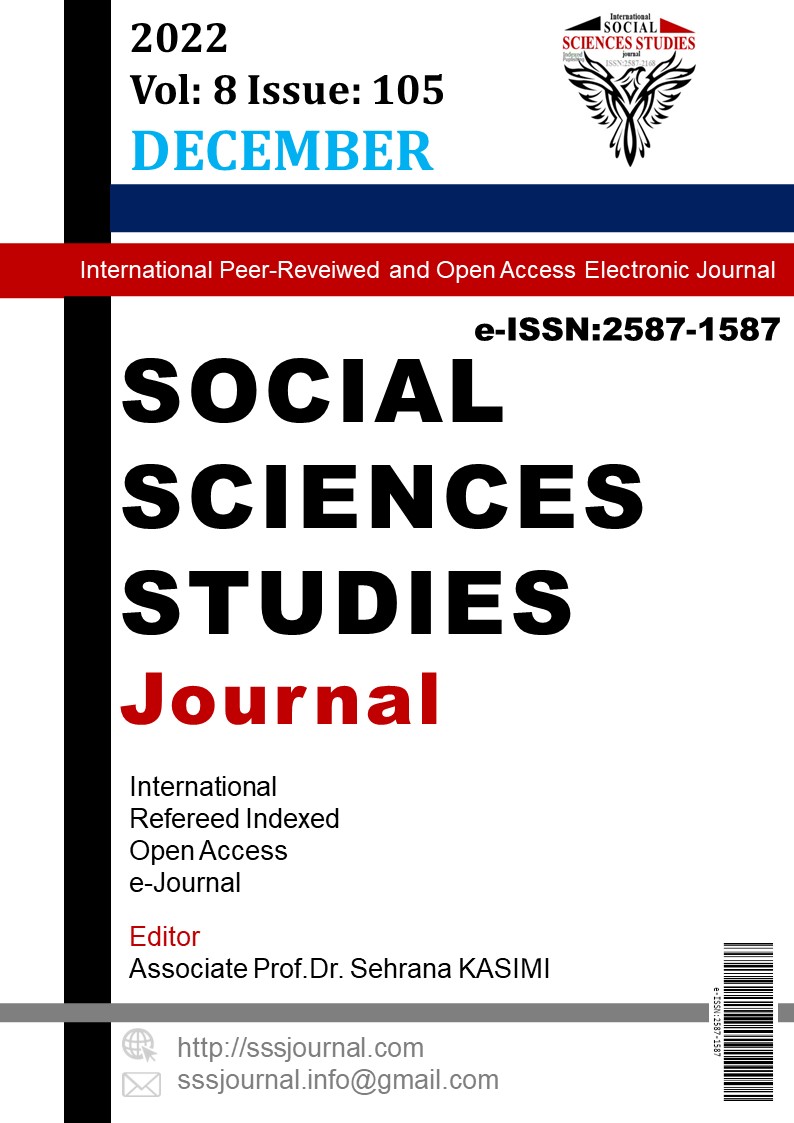Beşinci Sınıf Sosyal Bilgiler Dersinde Resfebe Kullanımı: Akademik Başarıya Etkisi ve Öğrenci Görüşleri
Author :
Abstract
Bu çalışmada beşinci sınıf sosyal bilgiler dersi “Etkin Vatandaşlık” öğrenme alanında resfebe kullanımının akademik başarıya etkisi ve uygulamaya yönelik öğrenci görüşlerini araştırmak amaçlanmıştır. Çalışma öntest sontest kontrol gruplu yarı deneysel desende gerçekleştirilmiştir. Çalışma grubunun belirlenmesinde kolay ulaşılabilir örnekleme yöntemi kullanılmıştır. Deney ve kontrol grupları tesadüfi örnekleme ile belirlenmiştir. Deney grubunda 20, kontrol grubunda 19 beşinci sınıf öğrencisi yer almıştır. Verilerin toplanmasında araştırmacılar tarafından geliştirilen akademik başarı testi ve öğrenci görüşme formu kullanılmıştır. Nicel veriler t-testi ile görüşme soruları ise içerik analizi çözümlenmiştir. Çalışmanın nicel bulgularına göre, deney grubunda uygulanan resfebe etkinliklerinin akademik başarıyı artırdığı sonucuna ulaşılmıştır. Nitel bulgulara göre ise beşinci sınıf öğrencilerinin sosyal bilgiler dersinde resfebe kullanımını eğlenceli, keyifli ve zevkli, ilgi çekici, öğretici ve motive edici buldukları sonucuna ulaşılmıştır. Beşinci sınıf öğrencileri, resfebelerin öğrenmelerine olumlu katkı yaptığını, derse aktif katılmalarında etkili olduğunu, kalıcı öğrenme ve görsel öğrenmeyi sağladığını, anlamayı kolaylaştırdığını ve başarılarını olumlu etkilediğini ifade etmişlerdir.
Keywords
Abstract
This study explores the effect of using rebus on academic achievement in the “Active Citizenship” learning area of the fifth-grade social studies course and students’ opinions. The study was carried out in a quasi-experimental design with pretest posttest control group. Convenience sampling method was used to determine the study group. Experimental and control groups were determined by random sampling. There were 20 fifth grade students in the experimental group and 19 fifth grade students in the control group. The academic achievement test and student interview form developed by the researchers were used to collect the data. Quantitative data were analyzed by t-test and interview questions were analyzed by content analysis. According to the quantitative findings of the study, it was concluded that the rebus activities applied in the experimental group increased the academic achievement. According to the qualitative findings, it was concluded that the fifth-grade students found the use of rebus fun, enjoyable, interesting, instructive, and motivating in the social studies course. Fifth grade students stated that rebus contributed positively to their learning, were effective in their active participation in the lesson, provided permanent learning and visual learning, facilitated understanding, and positively affected their success.
Keywords
- 1. Aksoy, A. B. & Dere Çiftçi, H. (2020). Erken çocukluk döneminde oyun. Pegem Akademi.
- 2. Alkan, A., Mertol, H. & Mertol, G. (2020). Özel yetenekli öğrencilerin bilişim teknolojileri derslerinde bir farklılaştırma örneği olarak resfebenin kullanımı. Avrasya Uluslararası Araştırmalar Dergisi, 8(21), 1-11. DOI: 10.33692/avrasyad.702886
- 3. Baki, Y. (2019). Türkçe dersi ortaokul kitaplarındaki zekâ oyunlarına ilişkin bir değerlendirme. Karadeniz İkinci Sosyal Bilimler Kongresi Tam Metin Bildiri Kitabı (ss.82). https://www.karadenizkongresi.org/_files/ugd/7cf5ba_9269c7dbf865485298aad05988206096.pdf
- 4. Bottino, R. M., Ferlino, L., Ott, M., & Tavella, M. (2007). Developing strategic and reasoning abilities with computer games at primary school level. Computers & Education, 49(4), 1272-1286. DOI: 10.1016/j.compedu.2006.02.003
- 5. Büyüköztürk, Ş. (2007). Sosyal bilimler için veri analizi el kitabı. PegemA.
- 6. Büyüköztürk, Ş., Kılıç Çakmak, E., Akgün, Ö.E., Karadeniz, Ş. & Demirel, F. (2019). Bilimsel araştırma yöntemleri. Pegem Yayınları.
- 7. Clark, C. R. (1981), Learning words using traditional orthography and the symbols of Rebus, Bliss, and Carrier. Journal of Speech and Hearing Disorders, 46(2), 191-196.
- 8. Creswell, J.W. (2008). Educational research: Planning, conducting, and evaluating quantitative and qualitative research. Pearson.
- 9. Creswell, J. W. (2019). Karma yöntem araştırmalarına giriş. Çev. Ed. M. Sözbilir. Pegem Akademi.
- 10. Çalış Zeğerek, E. (2019). Tarihsel süreçte rebus ve kullanım alanları. Yedi: Sanat, Tasarım ve Bilim Dergisi, (22), 31-40. DOI: 10.17484/yedi.532802
- 11. Çalış Zeğerek, E. (2020). Grafik tasarımda bir anlatım dili: Rebus tasarım. Yedi: Sanat, Tasarım ve Bilim Dergisi. (24), 127-139. DOI: 10.17484/yedi.730685
- 12. Devecioğlu, Y., ve Karadağ, Z. (2016). Amaç, beklenti ve öneriler bağlamında zekâ oyunları dersinin değerlendirilmesi. Bayburt Eğitim Fakültesi Dergisi, 9(1), 41-61.
- 13. Ekiçi M., Öztürk, F. & Adalar, H. (2017). Sosyal bilgiler öğretmen adaylarının zekâ oyunlarına ilişkin görüşleri, Researcher, 5(4), 489-502.
- 14. Koçyiğit, S., Tuğluk, M. N. & Kök, M. (2010). Çocuğun gelişim sürecinde eğitsel bir etkinlik olarak oyun. Atatürk Üniversitesi Kazım Karabekir Eğitim Fakültesi Dergisi, (16), 324-342.
- 15. Ott, M., & Pozzi, F. (2012). Digital games as creativity enablers for children. Behaviour & Information Technology, 3(10), 1011-1019.
- 16. Özpınar, M. (2020). Resfebe hücre başarı testinin geliştirilmesi ve fen bilimleri öğretmen adaylarının test hakkındaki görüşleri. Yayımlanmamış Yüksek Lisans Tezi. Gazi Üniversitesi Eğitim Bilimleri Enstitüsü.
- 17. Ross, S.M. and Morrison, G.R. (2011). Experimental research methods. In D.H. Jonassen (Ed.), Handbook of research for educational communications and technology (pp. 1021-1043). The Association for Educational Communications and Technology.
- 18. Sadıkoğlu, A. (2017). Zekâ ve akıl oyunları dersinin değerler eğitimindeki rolünün öğretmen görüşlerine göre değerlendirilmesi. Yayımlanmamış yüksek lisans tezi. İstanbul Sabahattin Zaim Üniversitesi, Sosyal Bilimler Enstitüsü.
- 19. Saygın O. & Saygın. E. (2017). Resfebe resimli kelime oyunları. Hayat Yayıncılık.
- 20. Sheehy, K. (2002). The effective use of symbols in teaching word recognition to children with severe learning difficulties: A comparison of word alone, integrated picture cueing and the handle technique. International Journal of Disability, Development and Education, 49(1), 47- 59.
- 21. Sipahi, B., Yurtkoru, E.S. & Çinko, M. (2008). Sosyal bilimlerde SPSS’le veri analizi. Beta Yayınları.
- 22. Şentürk Akkoyun, G. (2022). STEM yaklaşımının e-twinning projelerine etkileri. H. Özcan (Ed.). 2. Uluslararası STEM Öğretmenler Konferansı Tam Metin Bildirileri Kitabı (ss.56-66). Pusula.
- 23. Tavşancıl, E. (2002). Tutumların ölçülmesi ve spss ile veri analizi. Nobel.
- 24. Yıldırım, A. & Şimşek, H. (2013). Sosyal bilimlerde nitel araştırma yöntemleri. Seçkin Yayıncılık.
- 25. Yurteri, E. & Mertol, H. (2018). Özel yetenekli öğrencilerin coğrafya derslerinde bir farklılaştırma örneği olarak resfebenin kullanımı. Kırşehir Ahi Evran Üniversitesi Sağlık Bilimleri Dergisi, 2(1), 46-57.





